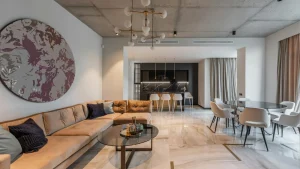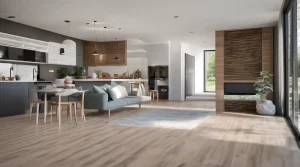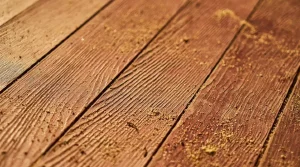Did you know that humidity can affect your flooring? It’s true! In this post, we’ll discuss how humidity can affect your flooring, and we’ll also provide some tips on how to keep your flooring in good condition. Stay tuned!
Related Article:How Floor Restoration Enhances Your Home
What is humidity, and why does it matter for flooring?
Humidity is the amount of water vapor in the air and is measured as a percentage. It can range from 0% to 100%. High humidity levels can cause your flooring to expand and contract, leading to buckling, warping, gaps, cracks, and other issues with installation.
Therefore, it’s essential that flooring is installed in a room that is within the manufacturer’s recommended humidity range. This range can vary depending on the type of flooring and its intended use, so it’s essential to check with your flooring supplier for specific instructions.
It’s also essential to keep humidity at a consistent level after installation. If needed, you should invest in a hygrometer to monitor humidity levels and use a dehumidifier or humidifier. This will help to maintain the condition of your flooring and prevent any of the issues mentioned above. Keeping your floors clean and free of dust and dirt can also help keep them looking great for longer.
It’s important to remember that humidity levels can change over time and with the seasons, so make sure you check your hygrometer regularly. By adequately managing humidity in your home, you can help keep your flooring looking great for years to come. But, it’s not just your flooring that can be impacted by humidity. High levels of humidity in the home can also cause respiratory problems, such as asthma attacks and allergies. Therefore, it’s important to monitor the humidity levels in your home and make sure they are within a healthy range.
How can humidity affect your flooring?
Regarding flooring, humidity can significantly affect its lifespan and performance. High humidity levels can cause swelling, warping, cracking, and other damage to your floors. This is especially true for wood floors which are prone to moisture absorption. Excess moisture can also lead to the growth of mold or mildew on floors, which can lead to health issues. Humidity can also impact the adhesives used in flooring, making them less effective or even causing them to fail prematurely.
To reduce the risk of humidity damaging your flooring, it’s essential to maintain an adequate humidity level in your home. The ideal range for most homes should be between 30%-50%. Using a dehumidifier or air conditioner can help keep your home’s humidity at the correct level throughout the year. Additionally, it is essential to regularly inspect your floors for any signs of water damage and take steps to fix them quickly if they are present. These measures will help ensure that your floors have a long lifespan and remain in good condition for years to come.
By understanding how humidity affects your flooring and taking steps to keep it at the correct level, you can protect your floors from damage and extend their lifespan. Doing so can save you money in the long run and ensure that your home’s flooring looks great for many years to come.
Risk of Mold and Mildew
It is an essential factor to consider regarding humidity levels is the potential for mold and mildew growth. High humidity can cause these spores to grow in your home, often resulting in an unpleasant odor and even health risks. It’s essential to monitor your flooring for any signs of mold or mildew growth, and if you notice any, address the issue immediately. Additionally, installing a dehumidifier in your home can help reduce the risk of mold and mildew growth. The dehumidifier removes excess moisture from the air, making it difficult for these spores to take hold and spread.
Another way to prevent mold and mildew growth is to keep your home ventilated. This means maintaining open windows, using fans, and ensuring air flows freely throughout the house. If you live in an incredibly humid area, consider installing a whole-house dehumidifying system that will reduce the overall humidity levels of your home. By proactively preventing mold and mildew growth, you can keep your home healthy and avoid any potential health risks associated with high humidity.
It’s important to remember that even if the relative humidity in your home is within the recommended range, it may still be prone to excessive moisture or mold growth. Always watch for any signs of mold or mildew growth and take steps to address them if you notice any. With a few simple steps, you can ensure your home stays safe and comfortable all year round.
Tips to keep your flooring in good condition.
- Regularly vacuum, sweep, and mop your floors to remove dirt and dust from the surface.
- Place floor mats at entrances or high-traffic areas to minimize dirt buildup.
- Add protective pads on furniture legs or baseboards to reduce scratches and dents in hardwood and tile floors.
- Avoid using abrasive cleaners and use mild soap and warm water when cleaning.
- When dealing with spills, use a damp cloth to clean up immediately; never leave liquids on the floor for an extended period.
- If you have hardwood floors, use rugs or area rugs to avoid scratches and reduce noise levels.
- Wax or seal your hardwood floors every few years to keep them looking new and protect them from damage.
- Avoid wearing high heels, cleats, or shoes with rough soles when walking on wood, tile, or stone floors.
- If you have pets, trim their nails regularly to reduce scratching of the floor surface.
- Make sure to regularly inspect your floors for damage and repair any cracks or chips as soon as possible.
Conclusion
Humidity can have a significant impact on your flooring. To ensure that your flooring is in the best condition possible, take steps to monitor and manage the humidity levels in your home. Additionally, follow the manufacturer’s instructions for any cleaning or maintenance products you use on your flooring. You can keep your flooring looking great for years with proper care and monitoring.
If you have questions about humidity and its impact on your flooring, Soto Flooring in Oklahoma City can help. We are a licensed contractor specializing in hardwood, tile, and laminate floors. Contact us today to learn more about how we can help keep your flooring in top condition.







